英国社会与文化
- 格式:docx
- 大小:14.63 KB
- 文档页数:3
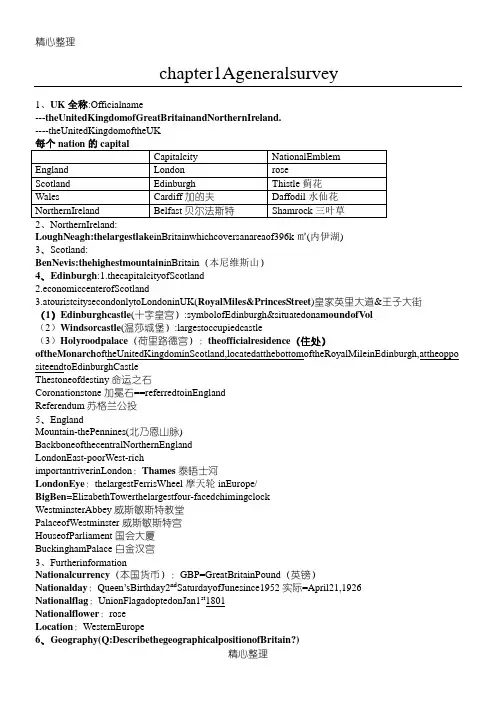
chapter1Ageneralsurvey1、UK全称:Officialname---theUnitedKingdomofGreatBritainandNorthernIreland.----theUnitedKingdomoftheUK每个nation的capitalCapitalcity NationalEmblemEngland London roseScotland Edinburgh Thistle蓟花Wales Cardiff加的夫Daffodil水仙花NorthernIreland Belfast贝尔法斯特Shamrock三叶草2、NorthernIreland:LoughNeagh:thelargestlake inBritainwhichcoversanareaof396k㎡(内伊湖)3、Scotland:BenNevis:thehighestmountain inBritain(本尼维斯山)4、Edinburgh:1.thecapitalcityofScotland2.economiccenterofScotland3.atouristcitysecondonlytoLondoninUK(RoyalMiles&PrincesStreet)皇家英里大道&王子大街(1)Edinburghcastle(十字皇宫):symbolofEdinburgh&situatedona moundofVol(2)Windsorcastle(温莎城堡):largestoccupiedcastle(3)Holyroodpalace(荷里路德宫):theofficialresidence(住处)oftheMonarch oftheUnitedKingdominScotland,locatedatthebottomoftheRoyalMileinEdinburgh,attheoppo siteendtoEdinburghCastleThestoneofdestiny命运之石Coronationstone加冕石==referredtoinEnglandReferendum苏格兰公投5、EnglandMountain-thePennines(北乃恩山脉)BackboneofthecentralNorthernEnglandLondonEast-poorWest-richimportantriverinLondon:Thames泰晤士河LondonEye:thelargestFerrisWheel摩天轮inEurope/BigBen=ElizabethTowerthelargestfour-facedchimingclockWestminsterAbbey威斯敏斯特教堂PalaceofWestminster威斯敏斯特宫HouseofParliament国会大厦BuckinghamPalace白金汉宫3、FurtherinformationNationalcurrency(本国货币):GBP=GreatBritainPound(英镑)Nationalday:Queen’sBirthday2nd SaturdayofJunesince1952实际=April21,1926Nationalflag:UnionFlagadoptedonJan1st1801Nationalflower:roseLocation:WesternEurope6、Geography(Q:DescribethegeographicalpositionofBritain?).Location---LocatedoffthenorthwestcoastofEurope ---anislandcountrysurroundedbyfourseas.tothesouthbytheEnglishChannel,whichseparatesitfromcontinentalEurope .totheeastbytheNorthSea .tothewestbytheIrishsea.tothenorthbytheAtlanticOcean 7、Land&People.veryunevenlydistributed:90%urban10%rural.Britain multiracial societyand1in20peopleareof non-European ethnicity 8、Climate :a Favorable MaritimeClimate (海洋性气候) Q:.arainy,changeableandunpredictableweather .mild (温和的)wintersandcoolsummers.asteadyandreliable (稳定的)rainfallthroughouttheyear.asmallrangeoftemperature(4-6℃inthenorthinWinter,and12-17℃inthesouthinsummer) AndFactor 影响因素.Thesurroundingwaters Q:.south-westwinds.NorthAtlanticDrift (北大西洋漂流)9、TheBritishIsles,GreatBritain,England,theUnitedKingdomandtheBritishCommonwealth Officialname+TheBritishIsles-----GreatBritain(England,Wales,Scotland) -----NorthernIreland(alsoknownasUlster)-----TheRepublicofIreland(alsotheIrishRepublic,formerly Eire) -----Numerous smallerislandsernment1、政治体制--议会制君主立宪制ConstitutionalMonarchy 君主立宪制ParliamentaryDemocracy 议会民主制 2、Monarch 君主:QueenElizabeth Ⅱ Born:April21,1926QueensinceJune2,1952 Officiallytheheadofstate,thecountryisactuallyrun BythegovernmentandledbythePrimeMinister3、MagnaCarta(=GreatCharter)大宪章KingJohn(agreedin)1215 Q:WhatpowersdoestheQueenhave? -Shereignsbutdoesnotrule(临朝不理政)Theoretically,sheisthesourceofallgovernmentpowers: .anintegralpartofthelegislature.headoftheexecutive,legislativeandjudiciarybranches .thecommander-in-chiefofallarmedforcesoftheCrown .”supremegove rn or”oftheChurchofEnglan d4、Parliament :Legislativebody Locatedin WestminsterQ:Parliamentconsistsof theSovereign,theHouseofLords&theHouseofCommons Parliament (aFrenchwordforatalking-place) .Femalesallowedtovoteuntil1918 BritishIslesUnitedKingdomIreland RepublicNorthern OfIrelandIreland GreatBritainScotlandWalesEngland WalesEngland.Aby-electionisheldwhenaMemberofParliamentdies,retiresorresigns(递补选举)Q:MainFunctionofParliament:.tomakelaws.tocontrolandcriticizetheexecutivegovernment.tocontroltheraisingandthespendingofmoney.todebatethemajorissuesofthedayTheHouseofLords上议院ConsistsoftheLordsSpiritual(神职议员)andthelordsTemporal(世俗议员)withtheLord chancellor(大法官)asthePresidentoftheHouseTheheadoftheHouseofCommons--theSpeaker议长NextonlytothePrimeMinisterHouseofCommonsnumberofmembers6505.Executive行政Executivebody:theSovereign,PrimeMinister&CabinetNo.10DowningStreet唐宁街10号→Legislature-Parliament→HouseofLords(semi-political)→HouseofCommons(Political)Monarch(non-political)→Executive:PrimeMinister&Cabinet(Political)→Judiciary:HouseofLords(non-political)Chapter3GeneralElection&PoliticalParties1.GeneralElection(1)Theelectorate(选民,有选举权者):About99%ofthepopulation(excludingcriminals,insane(疯的)people,etc)intheUKhaverighttovote.(2)Constituencies(选区):about650(3)Thetermofaparliament:5years(4)Thepartywhichholdsa majority oftheseatsinparliamentformsagovernment,withitspartyleader asPrimeMi nster(5)InBritainthecitizensaged18orover havetherighttovote.(6)InBritainacandidatemustbeatleast21orover withthedeposit(押金)of500pounds.(7)TheUK’s First-Past-the-Post(简单多数票当选)electoralsystem.Q:Itwascoinedasananalogytohorseracing1).Thewinneroftheraceisthefirsttopassaparticularpointonthetrack.2).Allotherrunnersautomaticallyandcompletelylose.3).Itis“winner-takes-all”(赢者统吃)4).Thecandidatemustreceivethelargestnumberofvoteswins.UnitedKingdomgeneralelection,2010The ConservativeParty,ledbyDavidCameron,wonthelargestnumberofvotesandseatsbutstillfelltwentyseat sshort.Thisresultedina hungparliament(悬垂议会)wherenopartywasabletocommandamajorityintheHouseofCommons.Coalitiontalks(联合声明)beganimmediatelybetweentheConservativesandtheLiberalDemocratsandlastedforfivedays.OnTuesday11M ay,BrownannouncedhisresignationasPrimeMinister,makingtheendof13yearsofLabourgovernment.Thiswas acceptedbyQueenElizabethⅡ,whotheninvitedDavidCamerontoformagovernmentandbecomePrimeMiniste r2.PoliticalPartiesHistoryofPoliticalParties---Priortothemid-19th:TheTory(托利党)TheWhig(辉格党)---Betweenthemid19th centuryand1920s:TheTories--theConservativeParty(保守党)TheWhig--theLiberalParty(自由党)---Post1920s:TheConservativePartyTheLabourPartyQ:.relativelyrichandprivileged.thepartyofthecentral-right.opposedtogreatchangesinsociety.haveabeliefinprivateenterpriseandfreedomfromstatecontrol.maintenanceoftheexistinginstitutionsasitspolicyBigNames.WinstonChurchill:PM1940-1945&1951-1955.MargretThatcher:PM1979-1990.DavidCameron:PM2010-presentQ:.relativelypoorandunderprivileged.thepartyofcentral-left(thereformist,non-revolutionary).aimingatthenationalizationasthemeansofproductionanddistribution.fewresourcesandheavilydependentonthetradeunions.haveamajoreffectonUK’s NationalHealthServiceBigNamesTonyBlair1997-2007GordonBrown2007-2010EdwardMiliband2010-2015JeremyCorbyn2015-presentChapter4Economy Introduction:1.Factoryoftheworld2.BritishDisease---amockingtermQ:Whatis“BritishDisease”?(1)atermusedtocharacterizeBritain’s economicdecline afterthewars.(2)Britain’s slowgrowth ofproductivity,soaringinflation,and largeunemployment3.a majordeveloped capitalistcountry4.6th largesteconomyin20125.3periodsofBritain economicevolution.Steadydevelopmentinthe50sand60s;.Economicrecessioninthe70s;.Economicrecoveryinthe80s;.Bythe1880s,dominant intheworld,*onethirdof thewo rld’smanufacturedgoods*half itscoalandiron*half itscotton.By1900,overtakenby USandGermany6.ReasonsforRelativeDeclineQ:WhatcausestherelativedeclineofUKEconomy?(1).heavilyintodebtinordertofinancethewar.(2).theeraoftheBritishEmpirewasover-decolonization殖民地独立(lossesofrawmaterial&market).(3).militaryexpense(untiltheprocessofdecolonizationcompletedinthe1960s).$.lackedinvestmentinmodernequipmentandnewproducts.$.lowratesofdomesticindustrialinvestment$.highrateofoverseasinvestment$.lackofacloserelationshipbetweenindustryandbanks.Absolutedeclinea.Introductionandrelativedeclineb.ReasonsforrelativedeclineEconomyc.RecentHistoryThecurrent PrimaryIndustriesUKeconomy SecondaryIndustriesTertiaryIndustriesCasesAnalysisPositiveEffectsNegativeEffects7.Primaryindustries--EnergyProduction.5%ofnationalwealth.Coal.oilandgas:NorthSea(decline since1999).producerandexporter.offshoreoilindustry8.Secondaryindustries*manufacturing(20%ofnationalwealth)Pharmaceuticals(GlaxoSmithKline),chemicals(ICI)Aerospace航天(3rd largestintheworld)Electronicsindustry(4th largestintheworld)9.Tertiaryindustries.Serviceindustries(65ofnationalwealth).Domesticactivity:retailing,tourism.Internationalservices(10%~70%).Financialandbusinessservices10.LondonStockExchange(伦敦证券交易所)In2010,amarketcapitalization(资本总额)ofUS$2.63trillion,madeitthefourthlargeststockexchangeintheworldandthelargestin EuropeChapter5literature1.OldEnglishPeriod(449-1066)Background:TheAnglo-SaxonsfromNorthernEuropebroughttheirlanguage,thebasisofModernEnglish,asw ellasaspecific poetictradition.OldEnglishliteratureisalsocalledAnglo-SaxonLiterature.✓Beowulf《贝奥武夫》:thenationalepicoftheAnglo-Saxons北欧大陆盎人迁移英格兰的英雄史诗,杀死海怪(seamonsterGrendel)teMedieval(中世纪)EnglishLiterature(1066-14thcentury)difficultiesandcalamities(灾害),suchasfamine,plague,andwar,(darkage)theBlackDeathfolkliterature(民间文学)✓RobinHood《罗宾汉》*GeoffreyChaucer杰弗里.乔叟-thefatherofEnglishpoetry(wisdom,humor,humanity)✓TheCanterburyTales..................《坎特伯雷故事集》(26stories) Itismadeupofaseriesofstoriestoldby pilgrims(朝圣者)toentertaineachotherontheirwaytotheChristianChurchatCanterbury3.EnglishRenaissancePeriod(15thcentury-early17th century)Staredin ItalyTheRenaissance-a Frenchword whichmeans rebirthorrevivalHumanism人文主义-theessence(本质)oftheRenaissance,thedignityofhumanbeing(人的尊严)&theimportanceofthepresentlife(珍惜当下).PeakofEnglishRenaissance:ElizabethanDrama英国文艺复兴时期的巅峰:伊丽莎白戏剧*WilliamShakespeare威廉·莎士比亚(1564-1616)✓Tragedies:RomeoandJuliet,Hamlet,Othello,KingLear李尔王,Macbeth麦克白✓HistoricalPlays:RichardⅢ,RichardⅡ,HenryⅣ,HenryⅤ✓Comedies:TheTamingoftheShrew悍妇,AMidsummerNight’sDream仲夏夜之梦,TwelfthNight,TheTempest,TheMerchantofVenice威尼斯商人Sonnet十四行诗(Afourteen-linelyricpoemwithasingletheme,usuallywritteniniambicpentameter)抑扬格五步格诗*ThomasMore托马斯.莫尔(1478-1535)✓Utopia《乌托邦》*JohnMilton约翰.弥尔顿(1608-1674)✓ParadiseLost《失乐园》*FrancisBacon弗兰西斯.培根✓Essays《随笔》4.TheNeoclassicalPeriod(新古典主义时期1660-1798)*AlexanderPope亚历山大.蒲伯(1688-1744)✓AnEssayonMan人论(=ParadiseLost)*SamuelJohnson塞缪尔.约翰逊✓TheDictionaryofEnglishLanguage/London(英语辞典)9年*JonathanSwift乔纳森.斯威夫特✓Gulliver'sTravels格列夫游记*DanielDefoe丹尼尔.笛福✓RobinsonCrusoe鲁宾逊漂流记*HenryFielding亨利.菲尔丁英国小说之父✓TheHistoryofTomJones,aFounding弃婴汤姆.琼斯的故事5.TheRomanticPeriod浪漫主义时期(1798-1832).twomajornovelistsoftheRomanticperiodareJaneAusten(realistic)andWalterScott(romantic) *RobertBurns罗伯特.彭斯✓ARed,RedRose一朵红红的玫瑰/AuldLongSyne往昔时光*WilliamWordsworth威廉.华兹华斯(beganwith)LyricalBallads抒情歌谣集/IWanderedLonelyasaCloud✓“湖畔”派诗人:WilliamWordsworth威廉.华兹华斯SamuelTaylorColeridge塞缪尔.泰勒.柯勒律治RobertSouthey骚赛*SamuelTaylorColeridge塞缪尔.泰勒.柯勒律治TheRimeofAncientMariner古舟子咏*GeorgeGordonByron乔治.戈登.拜伦✓DonJuan唐.璜*JohnKeates约翰.济慈✓OdetotheWestWind西风颂*WilliamBlake威廉.布莱克✓SongsofInnocence天真之歌✓SongsofExperience经验之歌SirWalterScott沃尔特.斯科特爵士(endedin)✓Ivanhoe《艾凡赫》(12世纪英国”狮心王”查理)*JaneAusten简.奥斯丁upper-middle-class✓SenseandSensibility理智与情感✓PrideandPrejudice傲慢与偏见✓Emma爱玛6.TheVictorianPeriod(1837-1901)维多利亚时期*CharlesDickens查尔斯.狄更斯✓OliverTwist雾都孤儿✓ATaleofTwoCities双城记✓GreatExpectations远大前程TheBronteSisters*CharlotteBronte✓JaneEyre简爱*EmilyBronte✓WutheringHeights呼啸山庄*AnneBronte✓AgnesGrey安格尼斯.格雷*WilliamThackeray威廉.萨克雷✓VanityFair名利场*ThomasHardy托马斯.哈代✓TessoftheD’Urbervilles德伯家的苔丝*OscarWilde奥斯卡.王尔德✓TheHappyPrinceandOtherTales快乐王子故事集✓TheNightingaleandtheRose夜莺与玫瑰7.TheModernPeriod*GeorgeBernardShaw乔治.伯纳.萧✓SaintJoan圣女贞德✓Pygmalion卖花女(MyFairLady窈窕淑女)Chapter6EducationTheUKSchoolSystem:compulsory(义务)betweenagesof5and16years,totalof11years1、Co-educatedSchools:1).admit bothboysandgirls联合教育学校2).AcademicYear:dividedintothreeterms,withholidays atChristmas,Easter,andinthesummer3).followthe NationalCurriculumguide-lines setdownbygovernment2、StateSchool:totallyfundedbythe government andfree3、IndependentSchool:foundedbythefeeschargedtothe parents(publicschool公学)4、PrimaryEducation:Pre-schoolingwhichcalled NurserySchool5、SecondarySchools:1).GrammarSchools(文法中学3%):“the11plus”examination,preparingstudentsforhighereducation.2).ComprehensiveSchools(综合中学83%):Noentranceexam,generaleducation.3).SecondaryModernSchool(现代中学7%)6、ThehighSchoolCurriculum:1)16years:GCSE Examination2)16-18years A-LevelCourse:3-4subjectsstudentschoosethesubjectstheywishtostudy.3)18years:A-LevelExaminationGCSE:GeneralCertificateofSecondaryEducation(中学生毕业证书)7、HigherEducation:receivefundsfromthe centralgovernment.Theamountoffundingisbasedon itssize,thenu mberofstudentsitteaches,andtheresearchitconducts8、EntranceProcedures:1).Studentscanapplytoamaximumof6universities/institutions.2).Admission--selectiononbasisof Alevelresults&aninterview9、FamousUniversities:1)TheUniversityofOxford:1.The oldestuniversity intheEnglishspeakingword.2.TeachingexistedatOxfordin1096anddevelopedrapidlyfrom1167.2)TheUniversityofCambridge:second-oldest (1281)---TwocharacteristicsofOxfordandCambridgeCollegesystem(学院制度)Tutorialsystem(导师制度)3)TheUniversityofLondon:1.Itwasfoundedin1836.(联邦制大学)2.a federation ofcolleges4)BuckinghamUniversity:theonly independent university5)OpenUniversity:UKlargestuniversityfor part-time higherChinese&BritishEducationSystemChineseHigherEducationEliteedu.VSMassedu.EnrollmentexpansionResourcesarestrainingEducationqualityissuffering IntensecompetitioninthejobmarketUnit7BritishForeignRelation1.---imperialhistory---geopoliticaltraits 地缘政治特点 2.HowForeignPolicyismade? ForeignPolicy→ThePM&Cabinet →Governmentdepartments3.Whenthesecondworldwarended,itwasstillthelargestmilitarypowerinwesternEurope.4.TheNuclearClubRussia,USA,France,Britain,Israel,China,India,Pakistan,NorthKorea 5.WhydoesBritainhaveitsnuclearnavalforce? ---Becauseit’satraditionalseapower. YearChina Age Britain Year5PrimarySchool1 1 Elementary School6 2 27 3 38 4 49 5 5 106 6 11 SecondarySchool7 7 JuniorMiddle School12 8 8 139 9 14 GCSECourseGCSEExaminations10 10 SeniorMiddleSchoo l15 11 11 16 A-LevelCourse A-LevelExaminations12 1217 136.MemberofUNSecurityCouncil联合国安理会---oneofthefivepermanentmembers(greatinfluence)---othermembers--Russia,China,theUS,France7.MemberoftheEuropeanUnionSince19738.MemberofNATO北约---NorthAtlanticTreatyOrganization---asystemofcollectivedefense9.TheCommonwealthofNations英联邦国家---TheBritishcommonwealthisafreeassociationofindependentcountriesthatwereoncecoloniesofBritain.殖民地10.TheUKanditsrelationwiththeUSA.AlliedduringWWⅡ√.WorkedtogetheragainstUUSR√.The1956SuezCrisis×11.Conclusion.Britainisnolongerasuperpower,butitstillhasgreatinfluenceinmilitarypowerintheworld(navy,nuclear).Britainforeignpolicyinfluencedmainlybyitshistoryandgeopoliticaltraits..Britainsitsataveryimportantseatinmanyinternationalinstitutions,suchastheUN,theEU,NATO,Common wealth,etc.Chapter8TheBritishMedia1.Whatfunctionsdoyouthinkthemediahave?.providepeoplewithinformationaboutpoliticalandsocialissues.provideweatherreports.carryadvertising.usedforeducationalpurposes.provideaforumforpeopletoexpresstheirviews.seekadvice.givepeopleentertainment.serveforthepoliticalandeconomicsystem.workasamonitor2.Newspaper(types)(1)Thequalitypress(thebroadsheets)严肃类大版面报纸(2)Thetabloids(thegutterpress)通俗类小版面报纸3.SomequalitynewspaperinUK(1)Times《泰晤士报》oldestdailynewspaper(2)TheDailyTelegraph《每日电讯报》--工党右(3)TheGuardian《卫报》(4)TheObserver《观察家报》oldestSundaynewspaper4.SometabloidsinUK(1).TheDailyMail《每日邮报》--保守党(2)DailyMirror《每日镜报》--工党(3)TheSun《太阳报》Chapter9Sports1.Football1)FootballAssociation(FA)2)FootballHooligans流氓,恶棍Policepatrolthestreets,pubsnearthefootballgroundsareclosed,andshopslocktheirdoor.2.TennisWimbledon温布尔顿3.GolfByScottishatSt.Andrew’s圣安德鲁斯4.HorseRacingRoyalAscot英国皇家爱斯科赛马会5.Equestrianism马术Chapter10Festival1.Religionsholiday:Christmas/Easter2.Nationalholiday:Queen'sbirthday3.Regionalholiday:EnglandBonfireNight篝火之夜NorthernIreland:St.Patrick’sDay圣帕特里克节3.17Scotland:Hogmanay除夕12.31Wales:Eisteddfod诗歌音乐比赛会Chapter4.2作家作品时代作者作品OldEnglishPeriod Beowulf《贝奥武夫》LateMedieval(中世)EnglishLiterature( 1066-14thcentury)RobinHood《罗宾汉》GeoffreyChaucer杰弗里.乔叟thefatherofEnglishpoetryTheCanterburyTales《坎特伯雷故事集》EnglishRenaissancePer iod(15thcentury-early 17thcentury) WilliamShakespeare莎士比亚Tragedies:RomeoandJulietHamletOthelloKingLear李尔王Macbeth麦克白HistoricalPlaysRichard3,Richard2Henry4,Henry5Comedies:TheTamingoftheShrew悍妇AMidsummerNight’sDream仲夏夜之梦TwelfthNightTheTempestTheMerchantofVenice威尼斯商人Sonnet十四行诗抑扬格五步格诗ThomasMore托马斯.莫尔(1478-1535)Utopia乌托邦JohnMilton约翰.弥尔顿(1608-1674)ParadiseLost失乐园FrancisBacon弗兰西斯.培根Essays《随笔》TheNeoclassical新古典主义Period(1660-1798) AlexanderPope亚历山大.蒲伯(1688-1744)AnEssayonMan人论,人性本恶SamuelJohnson塞缪尔.约翰逊TheDictionaryofEnglishLanguageLondonJonathanSwift乔纳森.斯威夫特Gulliver'sTravels格列夫游记DanielDefoe丹尼尔.笛福RobinsonCrusoe鲁宾逊漂流记HenryFielding亨利.菲尔丁英国小说之父TheHistoryofTomJones,aFounding弃婴汤姆.琼斯的故事TheRomanticPeriod浪漫主义时期RobertBurns罗伯特.彭斯ARed,RedRose一朵红红的玫瑰AuldLongSyne往昔时光WilliamWordsworth威廉.华兹华斯LyricalBallads抒情歌谣集IWanderedLonelyasaCloudSamuelTaylorColeridgeTheRimeofAncientMariner古舟子咏GeorgeGordonByronDonJuan唐.璜JohnKeats约翰.济慈OdetoaNightingale夜莺颂PersyByssheShelley雪莱OdetotheWestWind西风颂WilliamBlake威廉.布莱克SongsofInnocence天真之歌SongofExperience经验之歌SirWalterScott斯科特爵士Ivanhoe艾凡赫JaneAusten简.奥斯丁SenseandSensibility理智与情感PrideandPrejudice傲慢与偏见Emma艾玛TheVictorianPeriod(18 37-1901) CharlesDickens查尔斯.狄更斯OliverTwist雾都孤儿ATaleofTwoCities双城记GreatExpectations远大前程CharlotteBronteJaneEyre简爱EmilyBronte WutheringHeights呼啸山庄AnneBronte AgnesGrey安格尼斯.格雷WilliamThackeray威廉.萨克雷VanityFair名利场ThomasHardy托马斯.哈代TessoftheD’Urbervilles德伯家的苔丝OscarWilde奥斯卡.王尔德TheHappyPrinceandOtherTales快乐王子故事集TheNightingaleandtheRose夜莺与玫瑰TheModernPeriod GeorgeBernardShaw萧伯纳SaintJoan圣女贞德Pygmalion卖花女(MyFairLady窈窕淑女)。
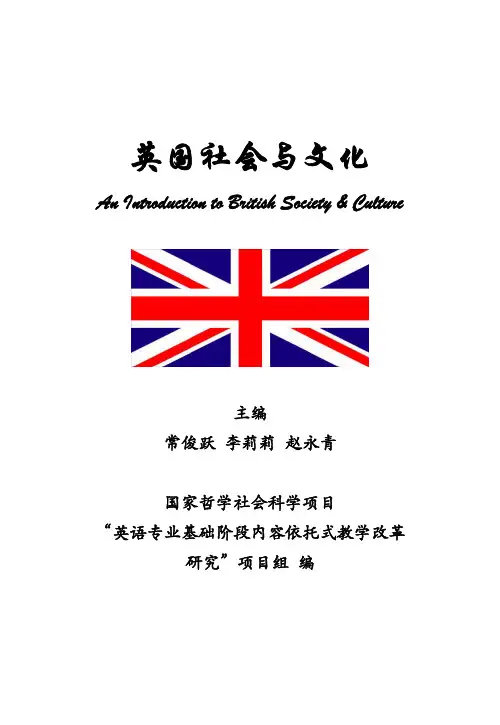
英国社会与文化 An Introduction to British Society & Culture主编常俊跃 李莉莉 赵永青国家哲学社会科学项目“英语专业基础阶段内容依托式教学改革研究”项目组 编ContentsUnit 1 The English Character (1)Text A The English Character (I) (1)Text B The English Character (II) (7)Text C The English Spirit of Control (11)Unit 2 The Constitutional Monarchy (14)Text A The Constitutional Monarchy (15)Text B The Role of the Monarchy Today (23)Text C The Queen’ s Official Birthday (25)Text D Diana, the People’s Princess (27)Unit 3 The British Parliament (33)Text A The British Government Today (34)Text B Political Parties in the U.K (39)Text C Margaret Thatcher (41)Unit 4 Food and Drinks in the U.K (45)Text A Food and Drinks in the U.K (46)Text B British Meals (51)Text C Pub Etiquette (53)Text D Leisure Time for Britons (56)Unit 5 The British Ways & Manners (60)Text A Politeness in Britain (61)Text B What’s Typically British (66)Text C Social Customs in Britain (68)Text D Name Roots (71)Unit 6 Education System in the U.K (74)Text A Going to School: British Style (75)Text B Schools in the U.K (79)Text C Boarding School (81)Unit 7 The British Welfare System (85)Text A Welfare System in the U.K (86)Text B The Welfare State (90)Text C The National Health Service (92)Unit 8 The British Media (94)Text A The British Press (95)Text B The Broadcast Media (100)Text C Local Newspapers in Britain (102)Text B Jury System in the Dock (113)Text C The Police in Britain (115)Unit 10 Family Life in the U.K (118)Text A Family Life in the U.K (119)Text B Changing Values & Norms of the U.K. Family (124)Text D Marriage Customs (127)Unit 11 The British Sports & Games (129)Text A The British Sports (130)Text B Cricket—A Very English Game (136)Text C The Highland Games (137)Text D Traditional Games in Scotland (139)Unit 12 Theatre & Music in the U.K (142)Text A Theatre & Music in the U.K (143)Text B Pantomimes (150)Text C Cats, the Classic Musical (151)Text D The Beatles (152)Unit 13 The British Holidays& Festivals (156)Text A Holidays and Festivals in the U.K (157)Text B Holiday Life in England (164)Text C Valentine Customs (166)Unit 14 The British Literature (I) (168)Text A Overview of British Literature (I) (169)Text B William Shakespeare (176)Text C To be, or not to be (177)Text D Of Studies (179)Unit 15 The British Literature (II) (182)Text A Overview of British Literature (II) (183)Text B Pride and Prejudice (191)Text C Christmas Dinner (193)Text D Agatha Christie––Queen of Crime (196)Appendix: Key to the Exercises (200)重点参考的书目和网站 (214)Unit 1The English CharacterSuccess is the ability to go from one failure toanother with no loss of enthusiasm.——Winston ChurchillUnit Goalsz To understand character and personality of English people e To understand character and personality of English peopl z To get acquainted with some basic cultural concepts concerning English characterTo get acquainted with some basic cultural concepts concerning English character z To learn some useful words and expressions on English character To learn some useful words and expressions on English characterBefore You ReadWork with your partner and share ideas with each other.1) What are the first three things that come into your mind when you hear the words “Britain” or “Britons”?E.g. When I think of “the English” I think of…____________________________________________________________________________________________________________________________________________2) What do you think of the Britons?What are the three descriptivewords you associate the most withthe British people?E.g. _____, _____, _____Start to ReadText A The English Character (I)1. To other Europeans, the best known quality of the British, and inhe never tells you anything about himself, and you may work with him for years without even knowing where he lives, how many children he has, and what his interests are. English people tend to be like that.2. If they are making a journey by bus they will do their best to findan empty seat; if by train, anempty compartment. If theyhave to share the compartmentwith a stranger, they may travelmany miles without starting aconversation. If a conversationdoes start, personal questions like“How old are you?” or even“What is your name?” are noteasily asked.3. This reluctance to communicate with others is an unfortunate quality in some ways since it tends to give the impression of coldness, and it is true that the English (except perhaps in the North) are not noted for their generosity and hospitality. On the other hand, they are perfectly human behind their barrier of reserve, and may be quite pleased when a friendly stranger or foreigner succeeds for a time in breaking the barrier down. We may also mention at this point that the people of the North and West, especially the Welsh, are much less reserved than those of the South and East.4. Closely related to English reserve is English modesty. Within their hearts, the English are perhaps no less conceited than anybody else, but in their relations with others they value at least a show of modesty. Self-praise is felt to be impolite. If a person is, let us say, very good at tennis and someone asks him if he is a good player, he will seldom reply “Yes,” because people will think him conceited. He will probably give an answer like, “I’m not bad,” or “I think I’m very good,” or “Well, I’m very keen on tennis.” Even if he had managed to reach the finals in last year’s local championships, he would say it in such a way as to suggest that it was only due to a piece of good luck.faults, one’s own failure, even atone’s own ideals. The criticism ,“He has no sense of humor” isvery commonly heard in Britain,where humor is highly prized. Asense of humor is an attitude tolife rather than the mere abilityto laugh at jokes. This attitude isnever cruel or disrespectful ormalicious . The English do not laugh at a cripple or a madman, or a tragedy or an honorable failure.6. Since reserve, a show of modesty and a sense of humor are part of his own nature, the typical Englishman tends to expect them in others. He secretly looks down on more excitable nations, and likes to think of himself as more reliable than they. He doesn’t trust big promises and open shows of feelings, especially if they are expressed in flowery language. He doesn’t trust self-praise of any kind. This applies not only to what other people may tell him about themselves orally, but to the letters they may write to him. To those who are fond of flowery expressions, the Englishman may appear uncomfortably cold.7. Finally, sportsmanship . Like a sense of humor, this is an Englishin ideal which not all Englishmen live upto. It must be realized that sport in thismodern form is almost entirely aBritish invention. Boxing, rugby,football, hockey, tennis and cricketwere all first organized and given rulesin Britain. Rules are the essence ofsport, and sportsmanship is the abilityto practice a sport according to its rules,while also showing generosity to one’sdefeat. The high pressure of modern international sport makes these ideals difficult to keep, but they are atleast highly valued in Britain and are certainly achieved there more commonly than among more excitable peoples. Moreover, sportsmanship as an ideal is applied to life in general this is proved by opponent and good temperwell-aimed, strong criticism and “below the belt” is used to describe an unfair one. One of the most elementary rules of life is “never hit a man when he’s down”—in other words, never take advantage of a person’s misfortune. English schoolboys often show this sense of sportsmanship to a surprisingly high degree in their relations with each other.After You ReadKnowledge Focuspartner and share ideas with each other.1. Work with your W h a t w o u l d a n E n g l i s h m a n o r w o m a n u s u a l l y d o i n t h e f o l l o w i n g s i t u a t i o n s ?lishman makes a journey to somewhere by train… man’s skills inomething quite funny happening in public and annis match…rite T if the statement is true and F if it is false.emotional, and____ 2) t noted for their generosity and____ 3) are much less reserved than people of the____ 4) is an attitude to life rather than the mere____ 5) lder” and “below the belt” areAn Eng An acquaintance asks an English lady’s age…Someone pays compliments to an English tennis…There’s s Englishman happens to see it…An Englishman has just lost a ten2. W ____ 1) A reserved person is one who is quite tends gets excited easily.The British people are no hospitality.The Welsh,South and East.A sense of humor ability to laugh at jokes.“Straight from the shou sporting terms borrowed from rugby.Language Focusnings of the bold-faced words in this text and 1. Discuss the mea work with a partner to fill in the blanks with a proper word ormunicate with others, he usuallye guests are treated _______.as honeyis likely to. Fill in the blanks with the following expressions you have be noted for look down on be keen on2) If a person is reluctant to com __________ to start a conversation.3) The hostess is very hospitable , and th 4) Whenever anyone mentions the word “conceit ”, the image of Mr.Darcy comes into mind, he was thought to be_________.5) You’d better ____________those people who are sweet to your face and as malicious as hell behind your back.6) If you seek help from a friend known for generosity , he __________.2learned in this text.due to for a time live up totake advantage of apply to) This rule cannot be ________ any case.to speak English.ilty, but before longlong. I ________ outdooress is entirely ________ his hard work.nts.. Fill in the blanks with the proper forms of words in the1) (reserve) person is one who does not talk very much tosh (except perhaps in the North) are not 12) Students must ________ every opportunity 3) Conceited people always ________ others.4) _________ the police thought she might be gu they eliminated her from their list of suspects.5) This resort ________ its hot springs.6) It’s boring to stay at home all day sports.7) His succ 8) I hope I can ________ the expectations of my pare3brackets.A _____ strangers, does not show much emotion, and seldom gets excited.2) This _____ (reluctant) to communicate with others is an unfortunate quality in some ways since it tends to give the impression of coldness.3) It is true that the Englivery _____ hoolboys often show this sense of sportsmanship to a6)The _____ (criticize), “He has no sense of humor” is commonly heard in Britain, where humor is highly prized. 7)The typical Englishman secretly looks down on more (excite) nations, and likes to think of himself as more _____ (rely) than they. 8) English sc _____ (surprise) high degree in their relations with each other.Comprehensive WorkBritish sayings and try to use them to make 1) time saves nine.an’s poison.not make it drink.em.th.. Pair-work: work with your partner and share ideas with each re the English character with the American character. What 1. Study the following dialogues.A stitch in 2) One man’s meat is another m 3) You can lead a horse to water, but you can 4) The grass is always greener on the other side.5) Don’t cross your bridges before you come to th 6) The best advice is found on the pillow.7) Birds of a feather flock together.8) Don’t look a gift horse in the mou2other.Compa are the similarities and differences?Read Moregolden ”, “Empty vessels make the most noise ” andeirtuations isnot exclusively a sporting one. It describes the sort ofay appear fearless and calm on the surface, deepmanner.2) “Silence is “You are not put on to this earth to enjoy yourself ”. From the sayings above we can get the clue that the English parents want their children to be __________________________________.3) If there is one trait that absolutely singles out the English it is th shared dislike for anyone or anything that “________”.4) To the English the proper way to behave in almost all si to display a languid _____ to almost everything. Even in affairs of the heart, it is considered unseemly to show one’s feelings except ________.5) The term is behaviour both on and off the playing field that characterises everything the English really respect. The term refers to “________”.6) Whilst they m down the English suffer from agonising self-doubt, feeling that in many areas of human activity they just cannot cut the mustard. The underlined expression means __________.7) The English have a strong sense of history and they tend to fillul and inventive, but rarelyText B The English Character (II)S t i f f U p p e rL i p their homes with ______.8) The English are endlessly resourcef ________ their inventions.teristic English pose involveskeep The charac ing the head held high, the upper lip stiffand the best foot forward. In this position,conversation is difficult and intimacy of any kindalmost impossible. This in itself is a clue to theEnglish character.ting rather like the thre nd behaviour against all c od is also Eng in this certainty to the gen vessels make the most noise” and, most telling, “You are not put on to this earth to enjoy yourself”.Small wonder that they end up, as adults, ac e wise monkeys and emotionally in traction.But still the English defend their character a omers. Perhaps that is because Puritanism with its punishing work ethic assures them that their reward for all that restraint will come at a sort of school prize-giving ceremony in the world to come.If it is the latter, they are forgetting that since G lish—a firmly-held belief—any hedonism in the next world will probably be accompanied by mugs of bromide.Nevertheless, the English continue to bask eral astonishment of the rest of mankind.is one trait that absolutely singles out the English it is their shar an excess of emo English the proper way to behave in almost all situations is to d If there ed dislike for anyone or anything that “goes too far”.Going too far, as the English see it, covers displaying tion, getting drunk, discussing money in public or cracking off-colour jokes and then laughing at them noisily. Beyond the pale altogether is the man or woman who regales one with his or her titles or qualifications. The only acceptable place to air these is on an envelope.To the isplay a languid indifference to almost everything, though one may be seething underneath. Even in affairs of the heart, it is considered unseemly to show one’s feelings except behind closed doors.h man or woman refers to you as “a good sport”, you wil sively a sporting one. It describes the sort of beh If an Englis l know that you have really arrived. For to them it is a qualification normally never awarded to a foreigner and by no means within the grasp of all the English.The term is not exclu aviour both on and off the playing field that characterises everything the English really respect. In all physical trials, the goodIt goes without saying that the good sport will also be a good loser. The English are fiercely com S e l re will be no arguing with umpires or outward signs of disappointment. On the contrary, a remark such as “The best man won!” tossed airily to all and sundry, and never through clenched teeth, is obligatory even in the face of crushing defeat.This does not really fool anyone, for the petitive especially in matters sporting. They would rather be crossed in love than beaten on the tennis courts, but to let it be seen would be going too far.f -D o u b tapparent colossal self-confidence and moral certainty of the conquered and foreigners to be e helter-skelter slide from Empire to Commonwealth and S e n It is the English that is paradoxically one of their greatest stumbling blocks. For both qualities are, to a certain extent, only illusions. Whilst they may appear fearless and calm on the surface, deep down the English suffer from agonising self-doubt, feeling that in many areas of human activity they just cannot cut the mustard.All the time there were countries to be governed, the English could sublimate all their clamouring uncertainty. The scent of success served as incense at the altar of their self-assurance.But with th ever downwards, their doubts, like itches, have begun to plague them and it is considered bad form to scratch in public.t i m e n tglish have a strong sense of history. Because their past was so led with old thingsnot The En infinitely more glamorous than their present, they cling to it tenaciously. Mix this love of bygone ages with an unrivalled sentimentality and you have a heady mixture which can be sensed inevery aspect of the English life.Antique shops clutter upevery town and village. Englishhomes are fil only because please the eyebut because there is a feeling thatShi andfather/grandmother, it’s good eno niness is vulgar and the patina of age lends respectability. Thus they cling on to old furniture, old carpets, old chipped china, old kitchen gadgets and garden implements long after common sense dictates that they should be replaced.“If it was good enough for my gr ugh for me!”. The English cry goes up and each new invasion from the future is greeted with the indignant question: “What was wrong with the old one?”. And as far as the English are concerned, there is no answer to that.InventivenessThe English are endlessly resourceful and inventive, but rarely pro one unobserved by gh, he will come up with something with real pro 2. Read the following passage and finish the following exercises.sunny in English comedy shows,to tea drinking in England: The water musttrol is shown infit from their inventions. The inventor in his garden shed turning out gadgets and widgets tends to be almost exclusively male, lacking the more practical female genes in any great numbers.Often perceiving needs in daily life which have g the rest of his compatriots, he will beaver away 24 hours a day creating such indispensable items as the perfect egg boiler or the self-creasing trouser.Occasionally, thou mise like the hovercraft which will then be ignored by his countrymen and taken up by foreigners.1) The English national character is dualistic: One aspect i conservative, the other _____.2) Most Americans find nothing f since English humor is _____ oriented while American humor is more _____ oriented.3) There is a whole ritual be _____ rapidly, the teapot _____, the tea _____, then _____ at least 5 minutes in a teapot covered by a tea cosy.4) In the following passage, the English spirit of con the following aspects: English pubs, ______, pace of living and ______.The English national character is dualistic: One aspect is conservative, the other extroverted. The English people, like people of elsewhere, love to entertain themselves in some pleasure; however, their pleasure always know temperance.The pub is a fine example of the conservative aspect of English character. The pub, unlike the bar in the U.S., is a focal point for the “locals.” One goes to the pub for the same reasons one used to go to church: for fellowship and spiritual enlightenment. There is nothing flashy or plastic about most pubs. Many look like one’s living room, full of plush, soft chairs, couches, a fireplace, and bright lights. The pubs keep respectable hours, too—open from 10 A.M. to 2 P.M. and 5 P.M. to 10 P.M.; Friday and Saturday nights they stay open until 11 P.M. There are no all-night or 3 A.M. public bars. When the pubs close everyone goes home. The pub represents pleasure with control and in good taste.This control is also exemplified in English humor. Most Americans find nothing funny in English comedy shows, since English humor is word oriented while American humor is more action oriented.The same control that is found in English pubs and humor is also found in the English pace of living. Where else does one stand in line quietly for the bus or the taxi?barbarians drink tea by placinga tea bag in a cup of hot water.There is a whole ritual to teadrinking in England: The watermust be boiling rapidly, theteapot warm, the tea loose, thensteeped at least 5 minutes in ateapot covered by a tea cosy.Then and only then does onepour the tea into a cup and drink it. Not only old ladies in lace with Pekingese on their laps drink tea, but a whole nation of workers, entrepreneurs, and aristocrats have tea for breakfast, lunch, and, of course, all activity stops in the afternoon for thecustomary tea break.NotesWinston Churchill (1874–1965) was a Britishpolitician known chiefly for his leadership of theUnited Kingdom during World War II. He served asPrime Minister of the United Kingdom from 1940 to from 1951 to 1955. A noted 1945 and again statesman and orator, Churchill was also an officer in the British Army, a historian, a Nobel Prize-winning writer, and an artist.For FunBooks to ReadJules Verne, Around the World in Eighty Days —Phileas Fogg bets half his fortune against other members of the Reform Club he can travel around the world in 80 days or less.Peter Mandler, The English National Character —a historian of modern Britain challenges long-held familiar stereotypes and proposes an entirely new perspective on what it means to think of oneself as being English.Movies to SeeMr. Bean—Life is a difficultchallenge for Mr. Bean, whohas trouble completing even thesimplest of tasks. Thankfully, his perseverance is usually rewarded, and he finds an ingenious way around the problem.。
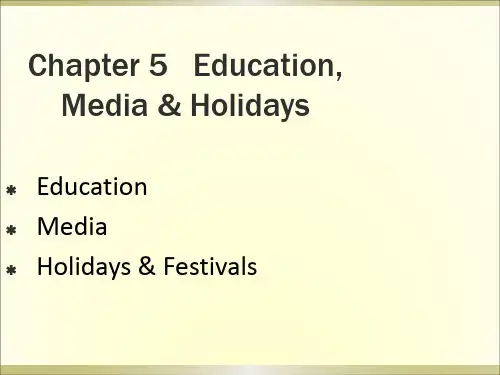
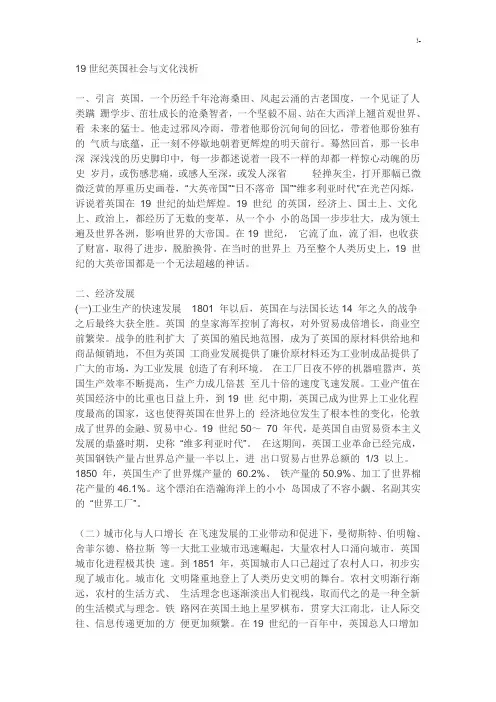
19世纪英国社会与文化浅析一、引言英国,一个历经千年沧海桑田、风起云涌的古老国度,一个见证了人类蹒跚学步、茁壮成长的沧桑智者,一个坚毅不屈、站在大西洋上翘首观世界、看未来的猛士。
他走过邪风冷雨,带着他那份沉甸甸的回忆,带着他那份独有的气质与底蕴,正一刻不停歇地朝着更辉煌的明天前行。
蓦然回首,那一长串深深浅浅的历史脚印中,每一步都述说着一段不一样的却都一样惊心动魄的历史岁月,或伤感悲痛,或感人至深,或发人深省······轻掸灰尘,打开那幅已微微泛黄的厚重历史画卷,“大英帝国”“日不落帝国”“维多利亚时代”在光芒闪烁,诉说着英国在19 世纪的灿烂辉煌。
19 世纪的英国,经济上、国土上、文化上、政治上,都经历了无数的变革,从一个小小的岛国一步步壮大,成为领土遍及世界各洲,影响世界的大帝国。
在19 世纪,它流了血,流了泪,也收获了财富,取得了进步,脱胎换骨。
在当时的世界上乃至整个人类历史上,19 世纪的大英帝国都是一个无法超越的神话。
二、经济发展(一)工业生产的快速发展1801 年以后,英国在与法国长达14 年之久的战争之后最终大获全胜。
英国的皇家海军控制了海权,对外贸易成倍增长,商业空前繁荣。
战争的胜利扩大了英国的殖民地范围,成为了英国的原材料供给地和商品倾销地,不但为英国工商业发展提供了廉价原材料还为工业制成品提供了广大的市场,为工业发展创造了有利环境。
在工厂日夜不停的机器喧嚣声,英国生产效率不断提高,生产力成几倍甚至几十倍的速度飞速发展。
工业产值在英国经济中的比重也日益上升,到19 世纪中期,英国已成为世界上工业化程度最高的国家,这也使得英国在世界上的经济地位发生了根本性的变化,伦敦成了世界的金融、贸易中心。
19 世纪50~70 年代,是英国自由贸易资本主义发展的鼎盛时期,史称“维多利亚时代”。
在这期间,英国工业革命已经完成,英国钢铁产量占世界总产量一半以上,进出口贸易占世界总额的1/3 以上。
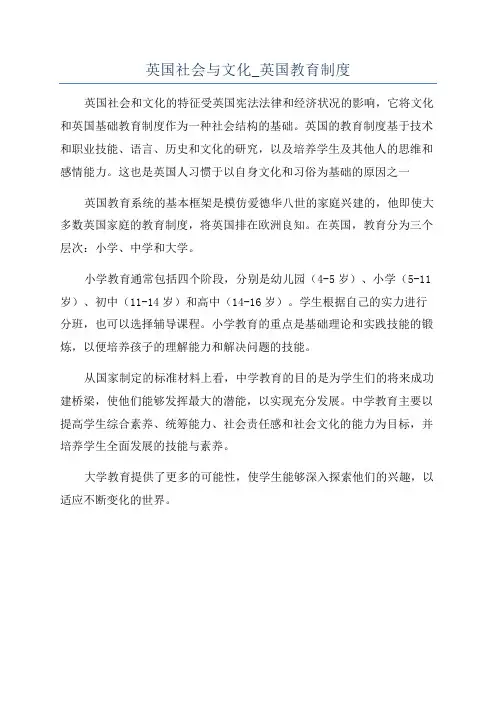
英国社会与文化_英国教育制度
英国社会和文化的特征受英国宪法法律和经济状况的影响,它将文化和英国基础教育制度作为一种社会结构的基础。
英国的教育制度基于技术和职业技能、语言、历史和文化的研究,以及培养学生及其他人的思维和感情能力。
这也是英国人习惯于以自身文化和习俗为基础的原因之一英国教育系统的基本框架是模仿爱德华八世的家庭兴建的,他即使大多数英国家庭的教育制度,将英国排在欧洲良知。
在英国,教育分为三个层次:小学、中学和大学。
小学教育通常包括四个阶段,分别是幼儿园(4-5岁)、小学(5-11岁)、初中(11-14岁)和高中(14-16岁)。
学生根据自己的实力进行分班,也可以选择辅导课程。
小学教育的重点是基础理论和实践技能的锻炼,以便培养孩子的理解能力和解决问题的技能。
从国家制定的标准材料上看,中学教育的目的是为学生们的将来成功建桥梁,使他们能够发挥最大的潜能,以实现充分发展。
中学教育主要以提高学生综合素养、统筹能力、社会责任感和社会文化的能力为目标,并培养学生全面发展的技能与素养。
大学教育提供了更多的可能性,使学生能够深入探索他们的兴趣,以适应不断变化的世界。
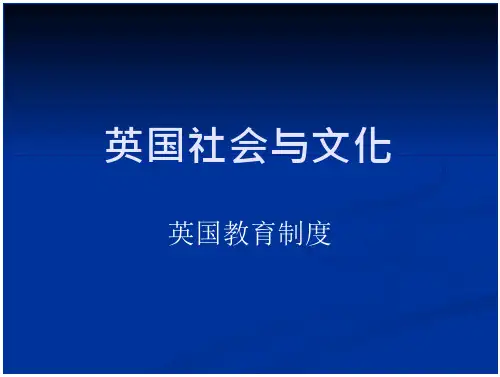
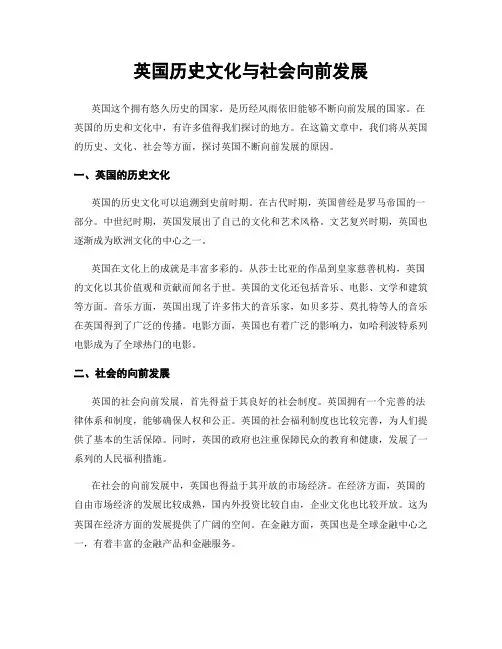
英国历史文化与社会向前发展英国这个拥有悠久历史的国家,是历经风雨依旧能够不断向前发展的国家。
在英国的历史和文化中,有许多值得我们探讨的地方。
在这篇文章中,我们将从英国的历史、文化、社会等方面,探讨英国不断向前发展的原因。
一、英国的历史文化英国的历史文化可以追溯到史前时期。
在古代时期,英国曾经是罗马帝国的一部分。
中世纪时期,英国发展出了自己的文化和艺术风格。
文艺复兴时期,英国也逐渐成为欧洲文化的中心之一。
英国在文化上的成就是丰富多彩的。
从莎士比亚的作品到皇家慈善机构,英国的文化以其价值观和贡献而闻名于世。
英国的文化还包括音乐、电影、文学和建筑等方面。
音乐方面,英国出现了许多伟大的音乐家,如贝多芬、莫扎特等人的音乐在英国得到了广泛的传播。
电影方面,英国也有着广泛的影响力,如哈利波特系列电影成为了全球热门的电影。
二、社会的向前发展英国的社会向前发展,首先得益于其良好的社会制度。
英国拥有一个完善的法律体系和制度,能够确保人权和公正。
英国的社会福利制度也比较完善,为人们提供了基本的生活保障。
同时,英国的政府也注重保障民众的教育和健康,发展了一系列的人民福利措施。
在社会的向前发展中,英国也得益于其开放的市场经济。
在经济方面,英国的自由市场经济的发展比较成熟,国内外投资比较自由,企业文化也比较开放。
这为英国在经济方面的发展提供了广阔的空间。
在金融方面,英国也是全球金融中心之一,有着丰富的金融产品和金融服务。
英国的社会发展还得益于其多元化和包容性。
英国是一个多元化的社会,有不同种族、不同文化和宗教信仰的人们生活在这个国家。
英国注重保护少数族裔和移民的权益,积极鼓励不同文化的人们进行交流。
三、英国的未来发展英国未来的发展也是值得期待的。
随着科技的不断发展和人工智能技术的普及,英国的产业结构也会不断变化。
基于这种变化,英国政府正在制定相应的政策,以促进未来的经济发展。
同时,英国政府也将进一步推进社会福利制度的改革和发展,以进一步提高人民的生活水平。
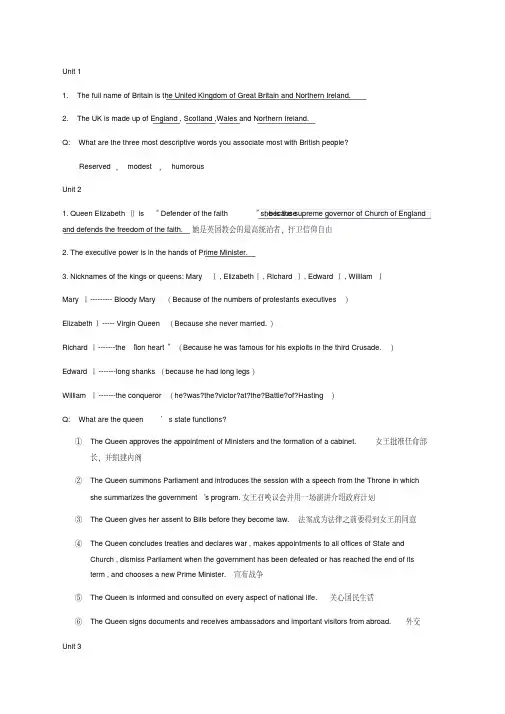
Unit 11.The full name of Britain is the United Kingdom of Great Britain and Northern Ireland.2.The UK is made up of England , Scotland ,Wales and Northern Ireland.Q: What are the three most descriptive words you associate most with British people?Reserved ,modest ,humorousUnit 2she is the supreme governor of Church of England 1. Queen Elizabeth Ⅱis “Defender of the faith”, becauseand defends the freedom of the faith.她是英国教会的最高统治者,扞卫信仰自由2. The executive power is in the hands of Prime Minister.3. Nicknames of the kings or queens: Mary Ⅰ, ElizabethⅠ, Richard Ⅰ, Edward Ⅰ, William ⅠMary Ⅰ--------- Bloody Mary (Because of the numbers of protestants executives)ElizabethⅠ----- Virgin Queen (Because she never married.)Richard Ⅰ-------the “lion heart”(Because he was famous for his exploits in the third Crusade.)Edward Ⅰ-------long shanks(because he had long legs)William Ⅰ-------the conqueror(he?was?the?victor?at?the?Battle?of?Hasting)Q: What are the queen’s state functions?①The Queen approves the appointment of Ministers and the formation of a cabinet.女王批准任命部长,并组建内阁②The Queen summons Parliament and introduces the session with a speech from the Throne in whichshe summarizes the government’s program.女王召唤议会并用一场演讲介绍政府计划③The Queen gives her assent to Bills before they become law.法案成为法律之前要得到女王的同意④The Queen concludes treaties and declares war , makes appointments to all offices of State andChurch , dismiss Parliament when the government has been defeated or has reached the end of itsterm , and chooses a new Prime Minister.宣布战争⑤The Queen is informed and consulted on every aspect of national life.关心国民生活⑥The Queen signs documents and receives ambassadors and important visitors from abroad.外交Unit 31.The constitution: statue laws, common laws and conventions.statue laws : passed by Parliamentcommon laws : be established through common practice in the courtsconventions : which are rules and practices which do not exist legally , but are nevertheless regarded asvital to the workings of government.2.The parliament today consist s of the Queen, the House of Lords and the House of Commons.3.Life peers: the Lords have been appointed by the sovereign , at the suggestion of the Prime Minister.上议院由君主任命,在总理的建议4.MP:the member of Parliament who is elected by and represents an electoral district of Britain known asa constituency.由选举产生的议会议员,代表英国的一个选区,被称为选区5.Political party: Conservative Party , Labor PartyConservative Party: Margaret Thatcher (the iron lady)Labor Party: Tony BlairUnit 6Q: How do students in Oxford and Cambridge study? What do you think of their method?Students at Oxford and Cambridge do not usually attend daily lectures and labs. Everyone studies either independently or in small groups guided by weekly sessions with a tutor. Tutors assign weekly essays orshort projects to track student progress. After three years, all students take exams and write researchpapers. A faculty committee decides if they have learned enough to graduate.在牛津和剑桥的学生通常不参加日常的讲座和实验室。
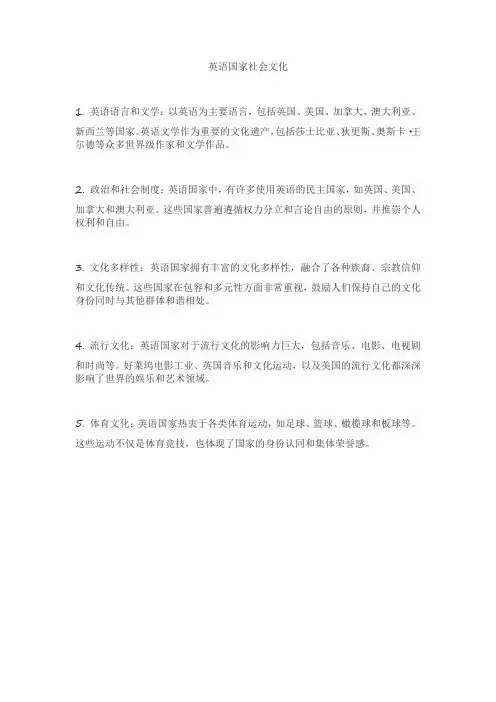
英语国家社会文化
1. 英语语言和文学:以英语为主要语言,包括英国、美国、加拿大、澳大利亚、
新西兰等国家。
英语文学作为重要的文化遗产,包括莎士比亚、狄更斯、奥斯卡·王尔德等众多世界级作家和文学作品。
2. 政治和社会制度:英语国家中,有许多使用英语的民主国家,如英国、美国、
加拿大和澳大利亚。
这些国家普遍遵循权力分立和言论自由的原则,并推崇个人权利和自由。
3. 文化多样性:英语国家拥有丰富的文化多样性,融合了各种族裔、宗教信仰
和文化传统。
这些国家在包容和多元性方面非常重视,鼓励人们保持自己的文化身份同时与其他群体和谐相处。
4. 流行文化:英语国家对于流行文化的影响力巨大,包括音乐、电影、电视剧
和时尚等。
好莱坞电影工业、英国音乐和文化运动,以及美国的流行文化都深深影响了世界的娱乐和艺术领域。
5. 体育文化:英语国家热衷于各类体育运动,如足球、篮球、橄榄球和板球等。
这些运动不仅是体育竞技,也体现了国家的身份认同和集体荣誉感。

19世纪英国社会与文化浅析一、引言英国,一个历经千年沧海桑田、风起云涌的古老国度,一个见证了人类蹒跚学步、茁壮成长的沧桑智者,一个坚毅不屈、站在大西洋上翘首观世界、看未来的猛士。
他走过邪风冷雨,带着他那份沉甸甸的回忆,带着他那份独有的气质与底蕴,正一刻不停歇地朝着更辉煌的明天前行。
蓦然回首,那一长串深深浅浅的历史脚印中,每一步都述说着一段不一样的却都一样惊心动魄的历史岁月,或伤感悲痛,或感人至深,或发人深省······轻掸灰尘,打开那幅已微微泛黄的厚重历史画卷,“大英帝国”“日不落帝国”“维多利亚时代”在光芒闪烁,诉说着英国在19 世纪的灿烂辉煌。
19 世纪的英国,经济上、国土上、文化上、政治上,都经历了无数的变革,从一个小小的岛国一步步壮大,成为领土遍及世界各洲,影响世界的大帝国。
在19 世纪,它流了血,流了泪,也收获了财富,取得了进步,脱胎换骨。
在当时的世界上乃至整个人类历史上,19 世纪的大英帝国都是一个无法超越的神话。
二、经济发展(一)工业生产的快速发展1801 年以后,英国在与法国长达14 年之久的战争之后最终大获全胜。
英国的皇家海军控制了海权,对外贸易成倍增长,商业空前繁荣。
战争的胜利扩大了英国的殖民地范围,成为了英国的原材料供给地和商品倾销地,不但为英国工商业发展提供了廉价原材料还为工业制成品提供了广大的市场,为工业发展创造了有利环境。
在工厂日夜不停的机器喧嚣声,英国生产效率不断提高,生产力成几倍甚至几十倍的速度飞速发展。
工业产值在英国经济中的比重也日益上升,到19 世纪中期,英国已成为世界上工业化程度最高的国家,这也使得英国在世界上的经济地位发生了根本性的变化,伦敦成了世界的金融、贸易中心。
19 世纪50~70 年代,是英国自由贸易资本主义发展的鼎盛时期,史称“维多利亚时代”。
在这期间,英国工业革命已经完成,英国钢铁产量占世界总产量一半以上,进出口贸易占世界总额的1/3 以上。
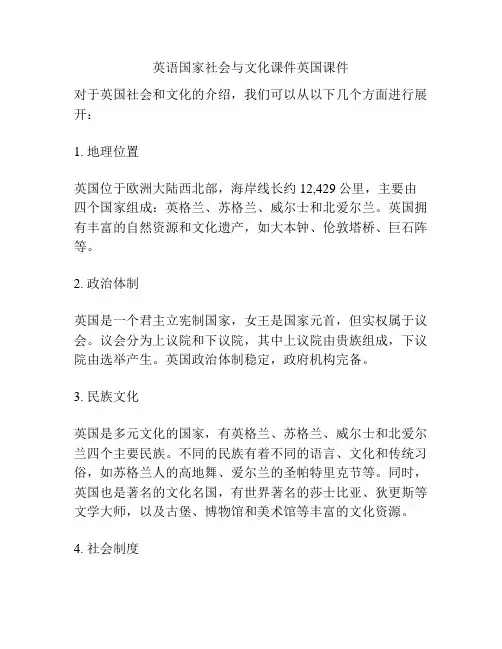
英语国家社会与文化课件英国课件对于英国社会和文化的介绍,我们可以从以下几个方面进行展开:1. 地理位置英国位于欧洲大陆西北部,海岸线长约12,429公里,主要由四个国家组成:英格兰、苏格兰、威尔士和北爱尔兰。
英国拥有丰富的自然资源和文化遗产,如大本钟、伦敦塔桥、巨石阵等。
2. 政治体制英国是一个君主立宪制国家,女王是国家元首,但实权属于议会。
议会分为上议院和下议院,其中上议院由贵族组成,下议院由选举产生。
英国政治体制稳定,政府机构完备。
3. 民族文化英国是多元文化的国家,有英格兰、苏格兰、威尔士和北爱尔兰四个主要民族。
不同的民族有着不同的语言、文化和传统习俗,如苏格兰人的高地舞、爱尔兰的圣帕特里克节等。
同时,英国也是著名的文化名国,有世界著名的莎士比亚、狄更斯等文学大师,以及古堡、博物馆和美术馆等丰富的文化资源。
4. 社会制度英国社会制度较为稳定,有完备的社会保障制度和医疗保健体系。
英国的教育制度也很完善,有优秀的大学和高等教育机构,如牛津大学、剑桥大学等。
5. 风俗习惯英国人对礼仪和规矩比较重视,在社交之中要注意面对对方微笑,并且敬酒等表达敬意的形式也十分重要。
在用餐时不吹食物、不说话,也要注意使用适当的餐具和方式。
英国的饮食文化也十分丰富,如英式早餐、茶文化等。
6. 体育文化英国人热爱体育,切尔西和曼联是足球俱乐部中较为著名的两支。
此外,英国还有板球、橄榄球、拳击等传统运动项目,在奥运会中也有不俗表现。
7. 经济发展英国是世界上最发达的经济体之一,金融、服务业和制造业是其主要产业。
伦敦是欧洲最重要的金融中心之一,也是世界上最多公司总部的城市之一。
总之,英国是一个历史悠久、文化繁荣、发达稳定的国家,其奇特的文化和历史令人向往。
18世纪英国文学社会历史背景
18世纪英国文学的社会历史背景主要有以下几个方面:
1. 女性权益的觉醒:18世纪初,英国社会对待女性的态度开
始发生变化。
女性开始参与教育和文化领域,对于自身权益的争取也逐渐增加,这对于当时的文学创作产生了积极的影响。
2. 工业革命的兴起:18世纪是英国工业革命的起始阶段,工
业化带来了大规模的城市化和社会变迁。
这种社会变迁对于文学创作提供了丰富的素材,同时也反映了当时社会的不平等和冲突。
3. 绅士文化的兴盛:18世纪的英国社会以绅士文化为主导,
绅士对于文学的热衷和对于教养的要求成为当时文学创作的主要动力。
许多文学作品也通过对绅士的塑造和探讨,表现出当时社会的价值观和道德规范。
4. 政治变革的影响:18世纪初,英国历经了光荣革命和格洛
斯特议会革命,国家政治制度发生了较大的变化。
这些政治变革对于文学创作产生了巨大的影响,作家们开始关注社会政治问题,并用文学作品表达对政治体制的思考和批评。
5. 文化启蒙运动的影响:18世纪的英国是启蒙运动的时代,
启蒙思想家们强调理性、人权和知识的重要性。
这种思潮对文学创作产生了深远的影响,作家们开始关注个体的自由和权益,并试图通过文学来推动社会变革。
总的来说,18世纪英国文学的社会历史背景反映了当时社会的动荡与变迁,以及人们对于个体权益、道德观念和政治体制的关注和思考。
同时,文学作品也成为表达和探讨这些问题的重要途径。
《英国社会与文化》教学大纲辛衍君编写英语专业课程教学大纲798 目录前言 (799)一、概述 (799)二、课程教学目的和基本要求 (799)三、课程主要教学内容及学时分配 (799)四、相关教学环节 (799)五、考核方法 (799)六、教学方法和手段 (799)Unit One: A General Survey of the United Kingdom (800)Unit Two: The Government of the United Kingdom (801)Unit Three: Politics, Class, and Race (802)Unit Four: The UK Economy (803)Unit Five: British Literature (804)Unit Six: The Education System (805)Unit Seven: British Foreign Relations (806)Unit Eight: The British Media (807)Unit Nine: Sports in Britain (808)Unit Ten: Holidays and Festivals in Britain (809)英国社会与文化前言一、概述《英国社会与文化》是英语专业本科的一门选修课。
本课程的学习旨在使学生了解英国的历史、地理、社会、经济、文化、政治、教育、宗教等方面的情况及其文化传统,促进对英语语言的深层理解和应用,拓展学生的西方文化视野。
本大纲编写人员为辛衍君。
二、课程教学目的和基本要求本课程以社会、文化为纲,多方面系统地概括和介绍英国的社会与文化方面的种种特点。
通过该课程的学习,学生应对英国的历史和现状有一定的了解;对英国的社会与文化有一个总体的把握,从而能从广义的文化哲学层面去审视西方文明的精髓,提高学生对中西文化差异的敏感性、海纳百川的文化兼容性以及处理文化差异的灵活性,培养和提高学生的跨文化交际能力。
英国社会与文化英国是一个历史悠久、文化繁荣的国家,拥有丰富多样的社会与文化景观。
本篇文档将介绍一些关于英国社会和文化的重要方面。
1. 英国的社会结构英国社会结构由四个主要的阶层组成:贵族阶层、上层中产阶级、下层中产阶级和工人阶级。
这种社会结构基于家庭背景、教育和就业等因素。
贵族阶层通常是由皇室成员和贵族血统的人组成,他们在政府和社会的各个领域发挥着重要作用。
上层中产阶级通常是财富和地位较高的人,他们在商务、金融和媒体等行业占据着重要地位。
下层中产阶级包括一些专业人士和中等收入家庭。
工人阶级是英国社会中最底层的人群,他们在服务业和制造业等行业从事体力劳动。
2. 英国的价值观和习俗英国人有着独特的价值观和习俗,其中最重要的是礼貌和谦逊。
英国人注重个人隐私和个人空间,尊重他人的意见和观点。
在社交场合,他们通常会排队、握手并进行适当的寒暄。
英国人喜欢喝茶,并且将其视为一种社交活动。
他们也喜欢观看足球比赛和参加音乐节或戏剧表演等文化活动。
3. 英国的语言和文学英语是英国的官方语言,也是全球使用最广泛的语言之一。
英国有着悠久的文学传统,从莎士比亚到狄更斯再到现代作家,英国文学一直占据着世界文学的重要地位。
一些著名的英国文学作品包括《哈利·波特》系列、《简·爱》和《1984》等。
4. 英国的节日和庆典英国有许多重要的节日和庆典,其中最著名的是圣诞节和复活节。
在圣诞节期间,家庭成员会相聚一起庆祝,并交换礼物。
复活节则是基督教的重要节日,人们会举行各种庆祝活动,如彩蛋砸碎和游行等。
在英国还有一些独特的庆典,如威斯敏斯特大礼拜仪式和爱丁堡国际艺术节等。
5. 英国的食物和饮料英国的食物和饮料具有自己的特色。
英国早餐以培根、鸡蛋、烤面包和熏肉为主要食材。
晚餐通常包括烤肉、蔬菜和煮土豆。
英国人喜欢喝茶和啤酒,并且有一些独特的饮料,如英式红茶和威士忌。
6. 英国的艺术和音乐英国是艺术和音乐的重要中心之一。
英国文化浅谈英国位于欧洲西部、大西洋的大不列颠群岛上,东濒北海,西临大西洋。
由于独特的地理环境,让英国的历史发展充满了传奇色彩也因此造就了英国富有特色的文化。
现选取政治、科技、教育、艺术几个方面概述。
一、政治文化英国是一个单一制、君主立宪的民主国家,它的政府体系(即所谓西敏制)直接影响了许多其他国家的政治体制,包括加拿大、印度、澳大利亚和牙买加等英联邦成员国。
英国没有成文的宪法,但宪法惯例(constitutional conventions)具有宪法的作用;各种成文法和普通法共同组成了所谓的英国宪法。
英吉利民族是一个理性的民族,他们重视经验,不惟书、不为理,只为实,相信实践的理性超越于抽象的理论,所以他们在不断的政治实践中发展、修正着自己的政治理论,譬如洛克,正是对实践精神的信奉,而不是像法国人那样迷恋于理想的世界,所以每一步都是脚踏实地。
加上英国人强大的传统——保守主义,独特的社会结构——贵族社会以及英国风度的贵族精神,所以,就注定了英国的政治发展是一个妥协、渐进的政治过程。
二、科技文化英国是近代工业革命的发祥地,并哺育出一大批世界著名的科学家,如牛顿、达尔文、麦克斯韦、瓦特和法拉第等以经典力学体系、进化论、电磁学、电力的使用和蒸汽机等方面的杰出成就,奠定了近代科学和现代科学坚实的基础,为世界科学技术众多领域的发展做出了举世瞩目的贡献。
直至今天,英国仍然是世界上最重要的科技强国之一。
英国的研究领域范围很宽,从对极地的研究,到热带病研究、全球气候变化研究等,都有英国人的研究工作和优势。
据英国研究报告表明,目前英国在生物科学、临床前研究、临床研究、环境科学领域的研究水平居世界第二位,数学研究、物理和工程研究居世界第四位。
总体上说,英国的科学研究,总体布局富有前瞻性,适应需要开展交叉学科研究,研究队伍精干,历史积累厚实,学术气氛浓郁开放。
按英国人自己的话说,就是以世界1%的人口,参与了世界5%的研究课题,贡献了世界9%的论文,并拥有12%的科学论文引用率。
Comparison Between British Education And Chinese Education Britain has a long tradition of education with hundreds of history. It is quite perfect and complex, and it has a great deal of flexibility. This kind of education system is considered one of the best in the world. Many other countries model their schools after British schools, and with good reason. More than 99% percent of all British citizens know how to read and write. All British public schools follow England’s National Curriculum set by the government’s Department of Education and Science. Every student studies English, science, mathematics, computer science, history, geography, art, music, physical education, and a foreign language.We should know that there are some similarities in the education of Britain and China. The similarities include the below factors: Both in China and Britain, school education includes primary education, secondary education and higher education. Furthermore, both in China and Britain, school education emphasize teach ers’ professional development and continuing education in teachers’ training. They attach importance to the professionalism of teachers, focus on training their own quality.Meanwhile, with the development of China and globalization, the education system in China is becoming more and more diversified and liberal. However, in general, it is still bound to past form, the exam-oriented education. A vast of Chinese student cannot study by themselves in a suitable way, even do not know the meaning of learning. Therefor, increasingly number of common people and experts begin to compare Chinese education system with British education system.Britain has more compulsory years of education than China: 11years in Britain and 9 years in China, while the higher education has less years, British education spend only three years in university and one year to get a master degree. And term arrangements are also different. There are two semesters in China and Britain has three terms. The distribution system of teachers between China and Britain is also quite different.In Chinese classrooms, all the desks are facing the podium. The teacher speaks in the above, and the following students can only be under the requirements to interact with the teacher, such as handing to answer questions. Apparently, Chinese teacherstake the typical instillation approach. But this is quite different in the UK. The teacher group the class according to the level of the students and often teach them in the form of groups. In class, teacher and students sit around a big table. Teachers are not always the protagonists, they will stay out of a lot of time for students to discuss and absorb. We can see that British teaching method is more instructive. From the of view efficiency, Chinese teaching method can teach students a lot of knowledge in a short period of time. In terms of the amount of knowledge, we definitely have an advantage over the UK. But British teaching advantage is that depending on this heuristic discussion, this will not only enable students to acquire knowledge, but also enable them to exercise critical thinking and self-learning ability. As the age grows, Chinese students may be better than British students in the mastery of the basics, but British students’ self-learning ability an d thinking ability will be stronger. What’s more, in my opinion, compared with emphasizing group discussion and cooperation of British education, lacking this kind of important aspect in Chinese education, Chinese students are more likely to absence spirit of cooperation.British schools are very concerned about the psychological of students, this aspect penetrates into the entire education. To some extent, however, British attention seems to be a bit too far. Some British media criticism over-protection of students' psychological will let the students unable to bear the cruel society out of the campus. In majority of situation, Chinese schools think that students’ achievement is more important than students’ psychological. Therefore, Chinese students either have strong enough mental, or the serious psychological problem suppressed for a long time has not been alleviated. Such students into the community, regardless of their own or the community is a great potential risk. To sum up, schools and teachers from China and Britain,even all over the world, are supposed to care about students' psychological in a appropriate way.China attaches importance to the knowledge-education, but Britain attaches importance to the capacity-education. With the deep influence of Confucius's idea, China focuses on the importance of knowledge education. Teachers teach students whatever textbooks have, and the examination can not break away from textbooks.Even when children go home after school, parents still ask them to take out their textbooks and let them consolidate the content they have learned in the class, then familiar with the new content; they can not get rid of the fixed framework of knowledge-education model. But the British teachers focus on capacity-education, they stress that the students can familiar with the things and phenomena what they want to know about, then under teachers’ instruction and guidance, they can find the right answers and discover new knowledge. British teachers pay more attention to train the childr en’ sense of independence, and let them to take the initiative.British people generally believe that, spoiling the child is the greatest obstacle to the formation of an independent character. To make children can adapt to the needs of the community, to live and work independently in the future, schools and parents must develop children’ ability to live independently when they were young. Besides, they should learn to respect others and self-restraint, and how to be accountable for their actions. British moral education does not require children to memorize ethics mechanically, but let children understand the ethics from the depths of the soul and daily life. One of the most important thing is that children are educated to learn taking care of themselves, but at the same time not interfering with other people.Because of different history, culture and economic strength, China and Britain have different education ways. We can not say critically that which is better: Chinese education or British education? Perhaps Chinese education is not as targeted enough as British in some aspects, but Chinese education is still very worthy in other aspects of our trust. In the face of British education, what we should do is to take the essence and discard the dross, pay more attention to the combination of theory and practice, and create the suitable methods for our education system.。